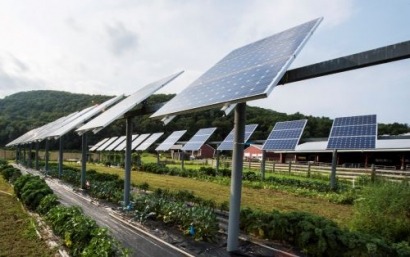
Olusola Bello
Technological improvements on solar components are likely to affect the volumes of solar waste in the future. As solar components over time are able to generate higher capacities of electricity, smaller components in terms of weight are likely to be adopted in the future.
“We leveraged on historical information to discount the projections made to reflect further technological improvements on the solar components. We were able to find information on the difference in capacity generation for solar panels and lithium-ion batteries in the last ten years.”
According to a report on Solar battery components by All On, it stated that its research shows that the average commercial solar panel converts 17- 19% of the light energy hitting it to electricity. This is up from the conversion rate of 12% a decade ago. In a similar manner, lithium-ion batteries generate about 1.5 times more electricity than they did 10 years ago.
The Disposal of solar energy components in Nigeria is mostly informal and carried out through scavengers and other informal and largely unregulated collectors.
Notwithstanding, these collectors serve as intermediaries between end-users and recyclers. They collect solar components from industrial and nonindustrial users before handing them over to formal recyclers for a fee.
Health risks associated with improper disposal Environmental impact of improper disposal
According to Human Rights Watch, over-exposure to lead from gold mining in Zamfara state resulted in the death of over 400 children in 2010.
Sulphuric acid electrolyte from lead-acid batteries is corrosive to the skin
On the environmental impact of improper disposal, air pollution from lead fumes and dust as well as contaminating Water.
Solar waste management in Nigeria, like every other e-waste, is yet to be fully established due to the conventional methods of waste management practiced in Nigeria.
In most cities across the country, there are visible piles of refuse that have built up on the roads, riverbanks and swampy land. Electronic waste is likely to cause environmental and health-related problems in parts of the country due to hazardous and toxic chemicals contained in components of electronic products include solar panels and used lead-acid batteries.
Nigeria currently lacks a well-established system for collection, separation, storage, transportation and disposal of e-waste as well as adequate enforcement and monitoring of regulations to hazardous E-waste
Solar users in Nigeria are classified into industrial and non-industrial end-users. End users either dump their solar waste at dumpsites/landfills, sell them to informal recyclers for a scrap fee or in rare cases, give them to formal waste collectors. Scavengers typically pick solar waste from landfills and proceed to remove valuable components while the remnants are discarded. There are only a few formal recycling companies in Nigeria, and they are generally more experienced in battery recycling compared to other solar





